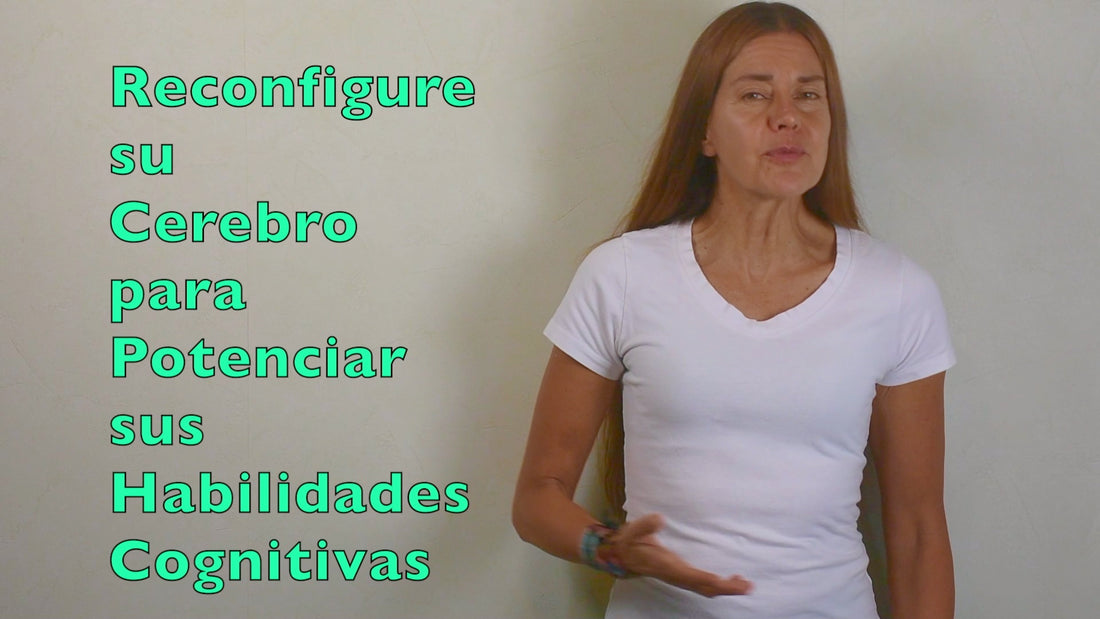
Learn how to Reset your Brain and Boost your Cognition
Share
As a journalist specializing in health, all forms that involve prevention, healing and benefit or empowerment of the body in its entirety have a place in my research and studies to share with each person who is aware that their health is the basis of their performance in all activities of their life.
Today I show you how to make some adjustments to your lifestyle habits and use certain techniques that can strengthen specific connections in your brain. According to researchers in this field, the components to maintain the plasticity of your brain or neuroplasticity, that is, the ability of the brain to adapt and evolve over time in structure and function would be challenge, novelty and focused attention. It seems that one of the best techniques to achieve focused attention would be Mindfulness.
Mindfulness
As Melissa Hogenboom explains in her article “ How I Rewired My Brain in Sin Weeks ”,
“Our brains have an incredible capacity to adapt, learn and grow because, by their very nature, they change… It was once thought to be limited to youth, but we now know that it is a constant force in shaping who we are. Every time we learn a new skill, our brains adapt.”
What excites me about this approach is that a growing number of studies indicate that by stimulating your brain, you may be helping to delay or prevent degenerative brain diseases.
The technique that Ms. Hogenboom chose in her publication is Mindfulness, and the results were very interesting. Mindfulness can improve attention, relieve pain and reduce stress. The experiments carried out indicate that, after a few months of training in mindfulness, certain symptoms of depression and anxiety can be alleviated (of course, it depends on the case of each person).
If cortisol, the stress hormone, is activated and remains elevated for a long time, it can be toxic to the brain and this would directly inhibit neuroplasticity. In this sense, Mindfulness can help to cope with stress, allowing the brain to remain more plastic or flexible.
The instructions themselves are not difficult, because it is about being aware of the present moment and paying attention to things that are normally ignored; as well as helping yourself by asking yourself: where are your thoughts going? and what occupies your mind moment to moment? The complex thing is being attentive to follow up.
In addition to Mindfulness, there are other techniques that can help you maintain neuronal plasticity.
Exercise and meditation in combination can activate and enhance brain plasticity
Physical activity facilitates the process of plasticity, I recommend my article and video on physical exercises that consolidate neuronal plasticity, and all the better if they are combined with cognitive tasks to improve skills that interest you, which will probably enhance them.
Physical health is linked to cognitive health from birth and babies are currently being studied in order to detect any propensity for brain failure in the newborn's brain.
The same concept appears to apply when patients recover from severe brain injuries. Hogenboon points out in his publication that scientists in Italy have detected that even in the worst conditions, the brain helps to repair itself in some way. With the neurorehabilitation that is being applied, recovery would be accelerated using methods such as robotics, virtual reality and the application of electric currents to the brain, obtaining a double effect.
In this order of ideas, Physical exercise as such forces you to increase blood flow to the brain and regeneration, which would shape and even restructure the brain by activating neuroplasticity.
Motor coordination and the continuous stimulation of brain synapses as a result of exercise are your best insurance against old age, as they provide a protective barrier against cognitive decline and diseases related to aging.
Challenging learning
Sorry, but it seems that crosswords and sudoku are not challenging enough, unless you are NOT a numbers person. It turns out that brain neuroplasticity requires activities that require a lot of attention, such as learning a new language or a musical instrument, and that involve a challenge.
A new language
This gives your brain a chance to create new neural connections. According to an example given in the article in www.yourheights.com magazine With the word "apple" the brain creates a new neural pathway between the image of an apple, the word in the native language, the sound of the word in the new language and its spelling, and stores it all in a memory that can be accessed whenever you need to say "apple" in the new language.
According to the same publication, in a study conducted with exchange students, five months of intensive language learning led to an increase in the density of gray matter in the brain . Gray matter is where the brain regions associated with language, attention, memory, emotions, and motor skills are housed. Therefore, increasing the density of this brain region may help protect the functioning of these areas as we age.
A musical instrument
Corroborated by Scientific American magazine , “Musicians (both professional and amateur) have a unique advantage because they not only have the opportunity to communicate emotions and themes from the depths of their soul with the universal language of music, but also to improve their brain health in important ways such as activating neuroplasticity in all areas of the brain.”
“You use the occipital lobe to read and interpret pitch and rhythm; the temporal lobe to process sound; the frontal lobe to pay attention to the music, inhibit irrelevant distractions, and remember what you just played; and the parietal lobe to integrate all the incoming sensory information.”
Studies show that musical training improves cognitive abilities (working memory, attention and inhibition, among others) throughout our lives. This has been demonstrated with both short- and long-term musical training and that a number of neural connections are also strengthened.
Musicians have the advantage of maintaining their cognitive abilities as they age, being able to concentrate better and filter out irrelevant stimuli. They can also hear more clearly in noisy environments. In this way, music benefits mental abilities throughout life.
Making music together can have physical and mental health benefits. For example, playing musical instruments has been linked to a lower risk of dementia.
A 2013 study found that recreational music can change the way our genes respond to stress. This indicates that listening to music may be more effective than reading in reducing stress, in the therapeutic field.
Travel
For starters, the opportunity to experience a new place opens your mind to new ideas and ways of life that you can apply to your everyday life. It allows you to establish new connections with different people and to be open to new cultures and to leave aside domestic or routine work issues.
As for your physical health, you are in “exploration” mode, which forces you to spend more time outdoors and to venture into another language, other foods, that is, to leave your comfort zone and this is what is considered synaptic gymnastics for brain neuroplasticity.
Perform exercises with the non-dominant side of the body
An almost automatic way that I, personally, have learned to use the non-dominant side of the body is by performing dumbbell and free weight exercises that alternate both sides of both arms and legs. Also, if you try to brush your teeth or hair with your non-dominant hand, you stimulate and reinforce neural pathways requiring your brain to focus deliberately.
Foods that can help you promote your brain health and neuroplasticity
Fatty fish
Oily fish has a substance called DHA, which is important for the brain. It also contains vitamin B12, selenium and phospholipids. DHA is 90% of the brain's omega-3 fats. If the brain doesn't get enough DHA, it can't function as well. DHA is found in the main part of the brain, especially in the frontal lobes. That's why eating foods with a lot of DHA helps improve memory and information processing.
Eggs
Eggs are a complete food as they contain the ideal proportions of the macronutrients protein, fat and carbohydrates. Likewise, its vitamin D content helps protect the brain from the accumulation of deposits that interfere with cognitive function.
Olive oil
Because it helps fight damage caused by free radicals and reduce toxic deposits in the brain, which promotes efficiency and fluidity in cognitive function.
Black chocolate
Due to its high content of flavonols and antioxidants that help fight free radicals in the brain, among other things.
Foods rich in sulforaphane
Sulforaphane, an active extract from cruciferous vegetables such as broccoli, cauliflower and kale upregulates genes that suppress oxidative stress, inflammation, and DNA damage.
Sulforaphane also improves mitochondrial function, promotes glutathione (GSH) synthesis, and crosses the blood-brain barrier to reduce nerve inflammation.
Several studies also show that sulforaphane increases GSH levels throughout the brain and in the periphery to attenuate oxidative stress, which also supports its potential application in cognitive enhancement.
Red fruits
Blueberries primarily contain anthocyanins, which are powerful weapons against free radicals (unstable molecules that damage cells).
Other fruits that have good effects on the health of brain cells are raspberries, blackberries and strawberries, which are a source of vitamin C, an antioxidant that protects the brain.
Green leafy vegetables
Green leafy vegetables, such as spinach and different types of lettuce, are usually rich in vitamin E, folate, vitamin K1, lutein and beta-carotene. Research has suggested that some or all of these nutrients may play a role in protecting the brain from inflammation and neuronal damage, as well as preventing the buildup of toxic proteins such as beta-amyloid peptide plaque.
Our brain has the ability to change throughout our lives. The brain itself makes an effort to recover and be well, although it has its limitations. But we can boost its efficiency by challenging ourselves, respecting our sleep hours, being physically active, and nourishing it with healthy foods and positive thoughts. Give it a chance!
